BHEKISISA PROFILE
The woman who built the electronic Covid-19 vaccination system – meet the Health Department’s Mrs Impossible
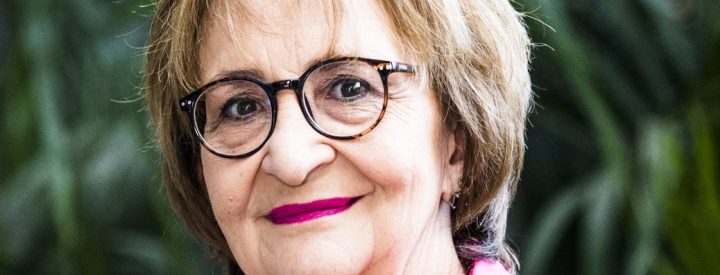
From growing up without a telephone to her appointment as the chief director of digital health systems in the national Health Department, the sweep of Milani Wolmarans’s life story is as wide as it is inspiring.
From the east-facing offices of the Health Department’s headquarters, the Voortrekker Monument stands in clear view. The terse dialogue between South Africa’s past and her present is inescapable here.
Look out the window and it is there. Log on to your laptop and it is there in the news headlines – in nearby Hammanskraal more than 30 people have died of cholera, a disaster that has its roots in connected failures across eras.
In the offices and boardrooms of the department’s AB Xuma building, named for Alfred Bathini Xuma, the first Black South African to become a medical doctor, the detail of a plan to address structural inequality in healthcare – the National Health Insurance – is being worked out daily.
At the heart of it all is the unlikely figure of Milani Wolmarans, an Afrikaans woman who grew up in a time that has all but faded from the country’s collective memory.
Building an EVDS: Seven days a week, 18 to 20 hours a day
After a short wait in the lobby I am taken to meet Wolmarans in the building’s landscaped atrium, where she is finishing a meeting with members of her new team. She’s dressed in a fuchsia blouse with matching lipstick.
I immediately recognise her timid smile from a series of television interviews she gave in April 2021, when South Africa’s Covid-19 electronic vaccination data system (EVDS) was launched.
I did not say no, it isn’t possible… That’s my modus operandi – before quitting you must first give it a try.
The widely celebrated EVDS was Wolmarans’s baby. As we go looking for an adequately swabbed table (“a clean table is one of my things”), Wolmarans recalls the first year of the pandemic with a kind of survivor’s pride.
“When Covid came in March 2020, we were briefed by the then health minister (Zweli Mkhize), and afterwards I called my team and said, ‘Are you ready to do everything in your power to assist the country to deal with the pandemic, from an information perspective? I’m in’.”
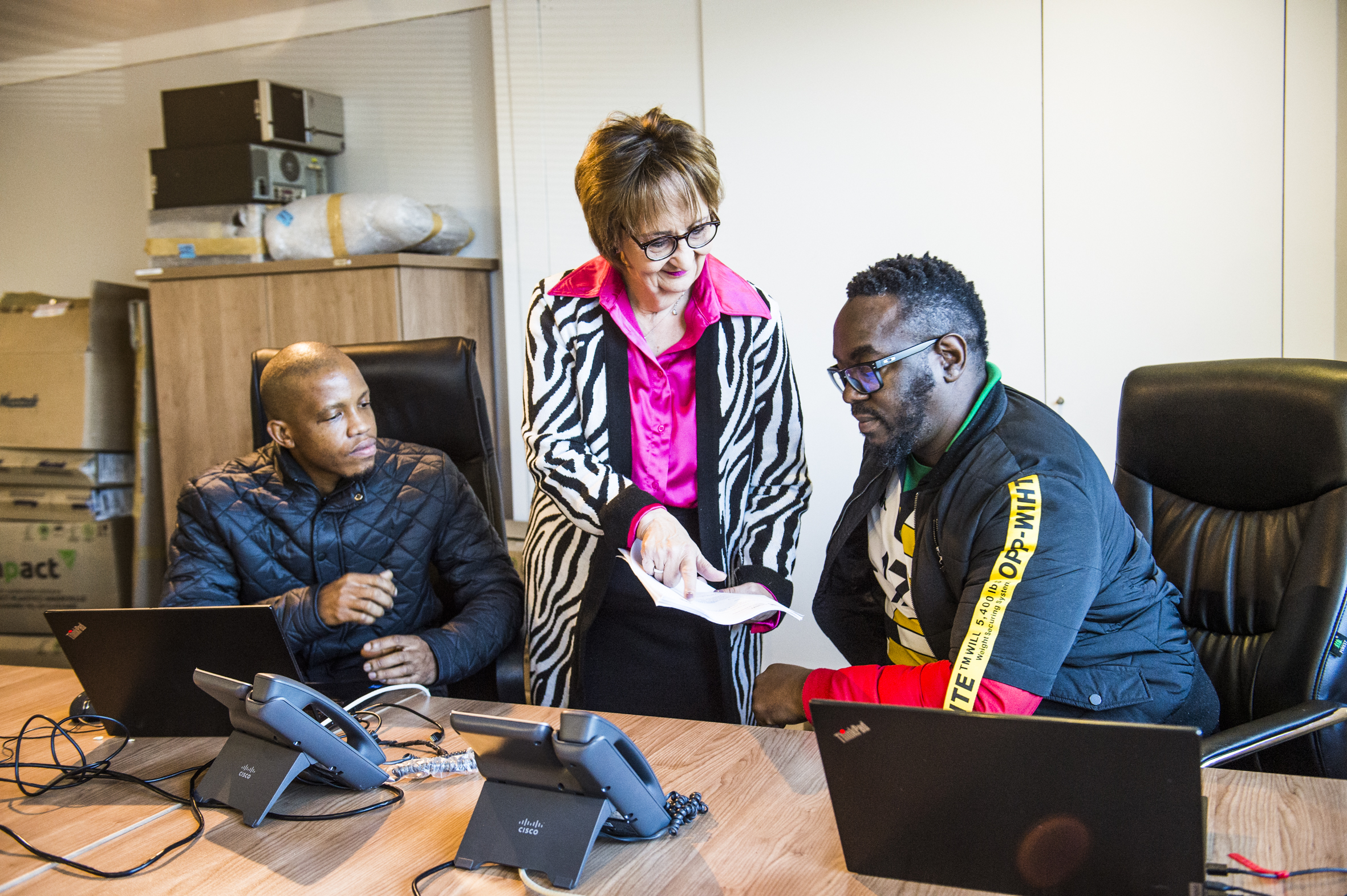
Wolmarans and her colleagues created an electronic vaccination data system in record time during Covid. Here she’s meeting with Desmond Masalesa en Batandwa Sukwama. (Photo Delwyn Verasamy)
Five days later, Wolmarans and her team moved to offices on the campus of a Tshwane-based scientific and technology research organisation (“I try to keep the people we work with a little bit secret, because otherwise they get harassed”) and started collecting relevant data – “hospital admissions, the status of hospital and intensive care unit beds, equipment stock levels, and so on”.
“We gathered all of that in a month from both the public and private systems and proceeded to develop the dashboards people came to know so well. It was very difficult, we worked seven days a week for the first month, 18 to 20 hours a day.”
On the first work day of 2021, Wolmarans was called by her new director-general, Sandile Buthelezi, who asked if she could, within a month, develop a patient information system for Covid-19 vaccinations.
“I did not say no, it isn’t possible. I said I will try my best and I will let you know how it unfolds. That’s my modus operandi – before quitting you must first give it a try.”
‘Nothing is impossible’
A month later, 7,500 vaccinators were digitally trained on the use of the system. Today, almost 39 million vaccination events have been recorded on the EVDS, Wolmarans says, which has been down for a grand total of five and a half hours since it went into production.
“My team has this philosophy that nothing is impossible,” she says, but Petro Rosseau, a long-term colleague of Wolmarans, says these are mantras Wolmarans has inculcated.
“It’s a very diverse team and not everyone joined at the same time, but in spite of that everyone is on the same page and working towards the same goals, and I think that speaks to her leadership.”
Wolmarans hesitantly acknowledges this.
“I have my parents to thank, especially my father, who remains my greatest mentor. He used to say things like, ‘How do you deal with something that seems humanly impossible? Well, you just start’. So ja, I think I have problem-solving in my genes.”
Swimming in the Orange River
By any measure, Wolmarans’s upbringing was unusual – she grew up with her brother and their parents in the gated diamond mining community of Alexander Bay in the Northern Cape. Like Oranjemund on the opposite bank of the Orange River, Alexander Bay lay within a sperrgebiet, or forbidden area.
“Nobody was allowed their own vehicle, and everything you needed – furniture, groceries – was provided by the mine, through the Staat Alluviale Delwerye (State Alluvial Diggings, now Alexkor).
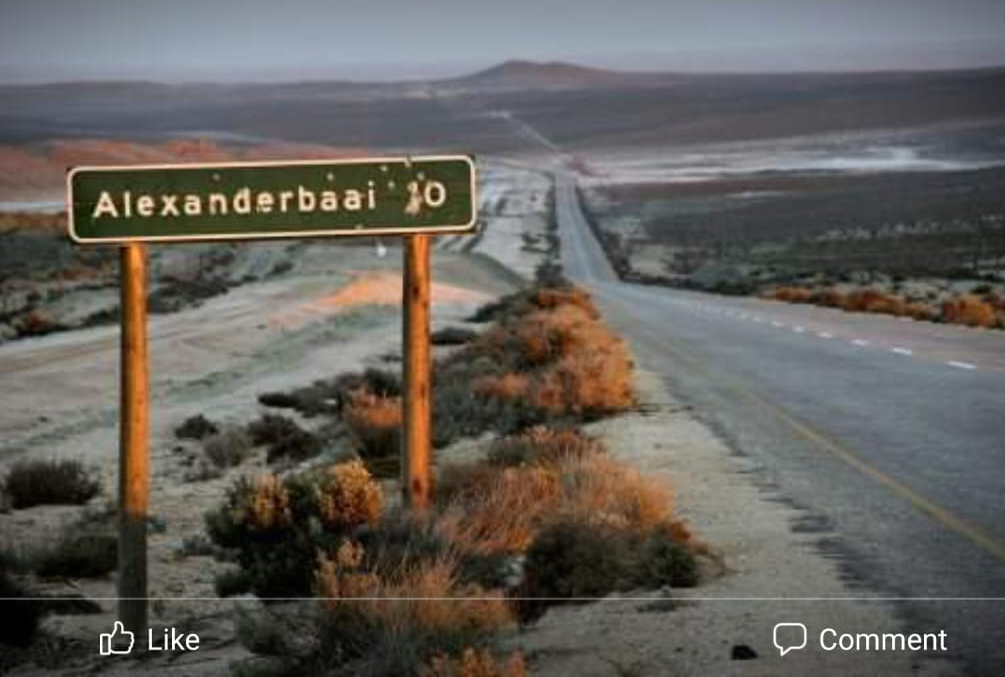
Wolmarans grew up in a mining community in a sperrgebiet (forbidden area) in Alexander Bay, where no one was allowed to own their own car or furniture. (Photo: Supplied)
“We always laugh because there was one shop, and if the shop sold orange dresses, then we all wore orange dresses, there was no alternative,” Wolmarans recalls.
Despite the environment being highly controlled, Wolmarans’s abiding memory is of exceptional freedom.
“We played, jis we played. Have you ever been to the Richtersveld? It’s just nothing in every direction, so we made up our own games. It was a humble upbringing, but I would not exchange it for anything.”
Swimming in the Orange river was akin to religion.
“After church on a Sunday the families would gather to braai at this spot on the river called Pachtvlei, and the children would swim all day. My brother and I used to challenge each other to swim across the river where the current is strongest, before it goes into the ocean.
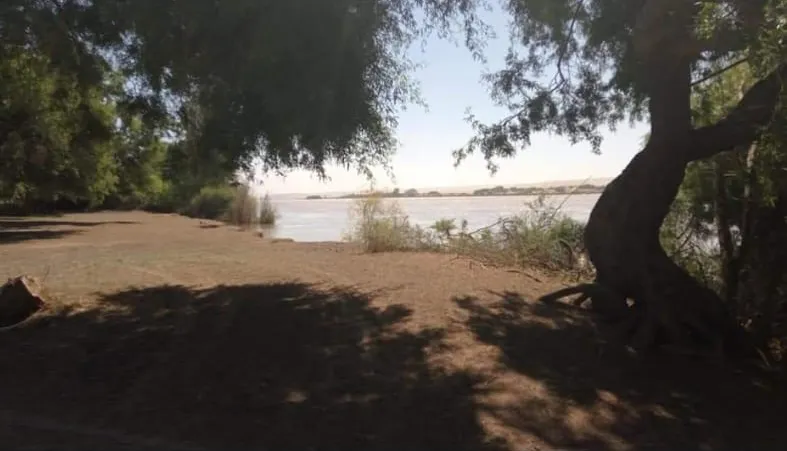
Pachtvlei is where families braaied and children swam all day long. (Photo: Supplied)
“We usually did it with a piece of rope in our mouth, and if something were to happen we would have pulled on the rope and someone would have dragged us out. It was risky, but that was my father for you – if you thought you could do something, he would say go ahead and try.”
Nommer asseblief: A tickey box and four five-cent pieces
Her experiences of growing up in Alexander Bay informed her communitarian beliefs.
“I learnt that I am not alone, I am part of a community, and as much as I give to other people, I will receive back,” says Wolmarans, who found it difficult to leave the Northern Cape to attend high school at La Rochelle Girls High in Paarl, “1,000km away”.
“You learn how to survive,” she says, adding that the loneliness she experienced was not helped by the fact that her family did not have an automatic telephone line.
Read more in Daily Maverick: Meet the healthcare workers who choose to live and work in SA’s poorest rural villages
“To make a call you had to go to the phone booth, and to connect with Paarl or vice versa you had to go through two… what do you call it in English… switchboards. With five cents you could call most places in South Africa from a tickey box, but I had to use four five-cent pieces, because I first go to Cape Town, then Cape Town goes to Port Nolloth, and finally Alexander Bay. ‘Nommer asseblief’, ‘nommer asseblief’, [Number, please],” Wolmarans mimics, chortling. (Nommer asseblief is a 1980s television comedy series about the life and times of a close-knit Afrikaans community.)
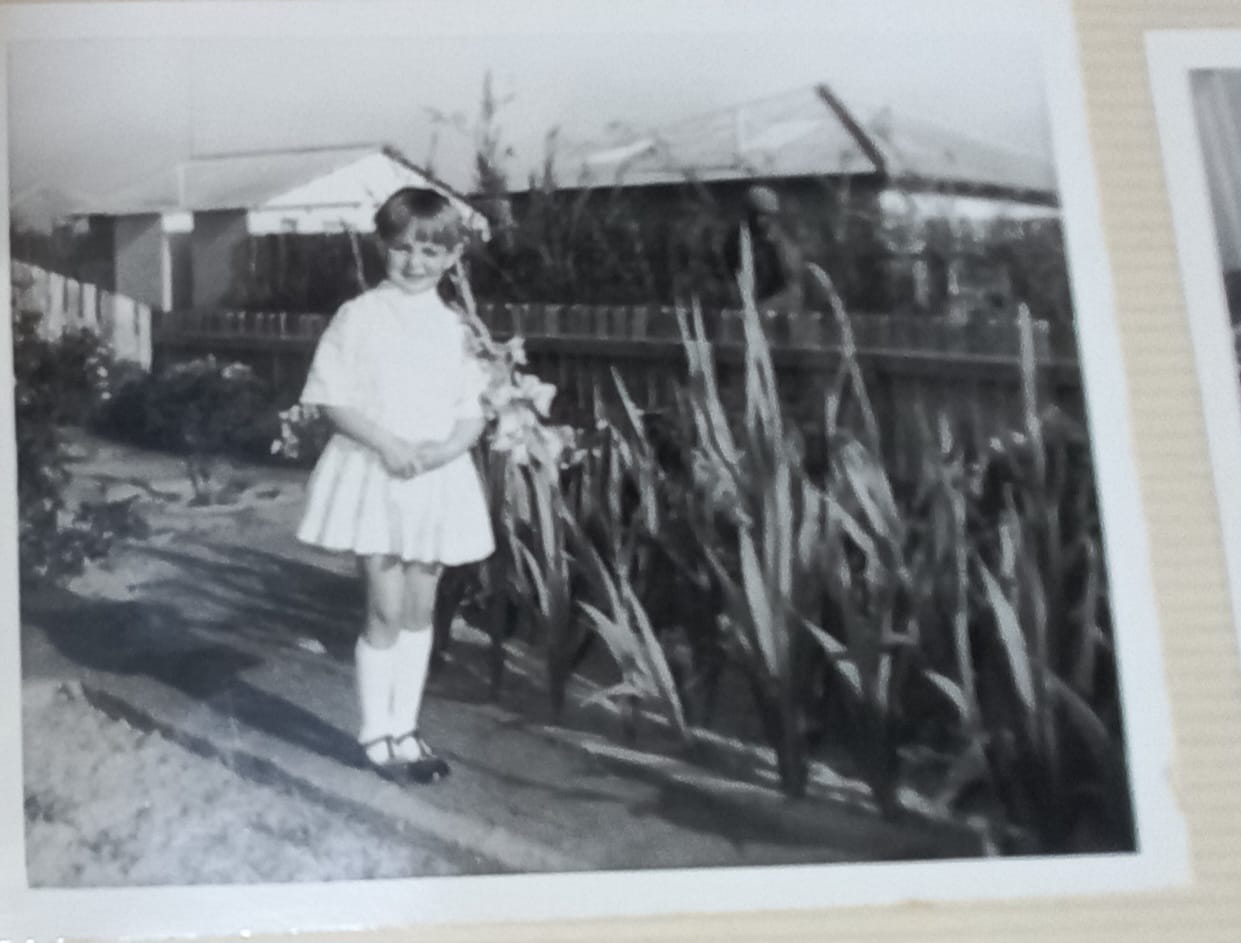
Wolmarans had to exchange the rural river town where she grew up for Paarl in the Western Cape when she went to high school. (Photo: Supplied)
From this to holding one of the most complex digital portfolios in the government today.
“I don’t really know how I ended up doing what I do,” she chuckles, but of course there is a story.
From Stellenbosch to Mpumalanga
After matriculating, Wolmarans attended Stellenbosch University where she studied occupational therapy, qualifying in 1986. She practised as an occupational therapist in what was then the Eastern Transvaal, but in 1994, the year of South Africa’s first democratic elections, her life changed course.
“I was pulled into the then strategic management team that guided the formation of the Mpumalanga health department, bringing together five different former homeland administrations,” she says.
In 1996, Wolmarans was appointed deputy director of rehabilitation and disability services, and for the next two years made it her business to engage with people with disabilities in every community in the province.
“I spent days engaging and talking to people with disabilities of all walks of life, to understand what their needs are and what their lives look like.”
What she witnessed and learnt (“I saw disabled children and adults living in appalling conditions, unable to access support due to poverty and low literacy, as well as cultural and language barriers”), spurred Wolmarans to develop one of the country’s first community-based rehabilitation programmes, led by disabled people who were contracted as consultants to identify potential beneficiaries in their communities and to then provide peer support and counselling as well as information on disability rights in order to reduce stigma.
A lot that I know today… stems from jumping in the deep end and finding my way up.
Says Wolmarans: “It was never going to be enough in this context to simply deliver supportive devices. You can deliver a wheelchair and weeks later it isn’t being used, and that’s where the consultants came in, because they were relatable and they provided support and information, and they broke the mindset of ‘I can’t’.”
“A lot that I know today is self-taught”
Rousseau believes that Wolmarans’s chosen occupation taught her the lessons that have helped to carry her to the highest levels of decision-making in public healthcare.
“To be an effective therapist you must see the patient within their context, and one of the things that Wolmarans consistently tells her team members is that the patient’s context really matters.
“She has a habit, until today, of visiting clinics wherever she goes and sitting in the waiting room until it’s her turn to see the professional nurse, and she will then ask for a few minutes to talk about their experience of practising in that clinic and community,” Rousseau says.
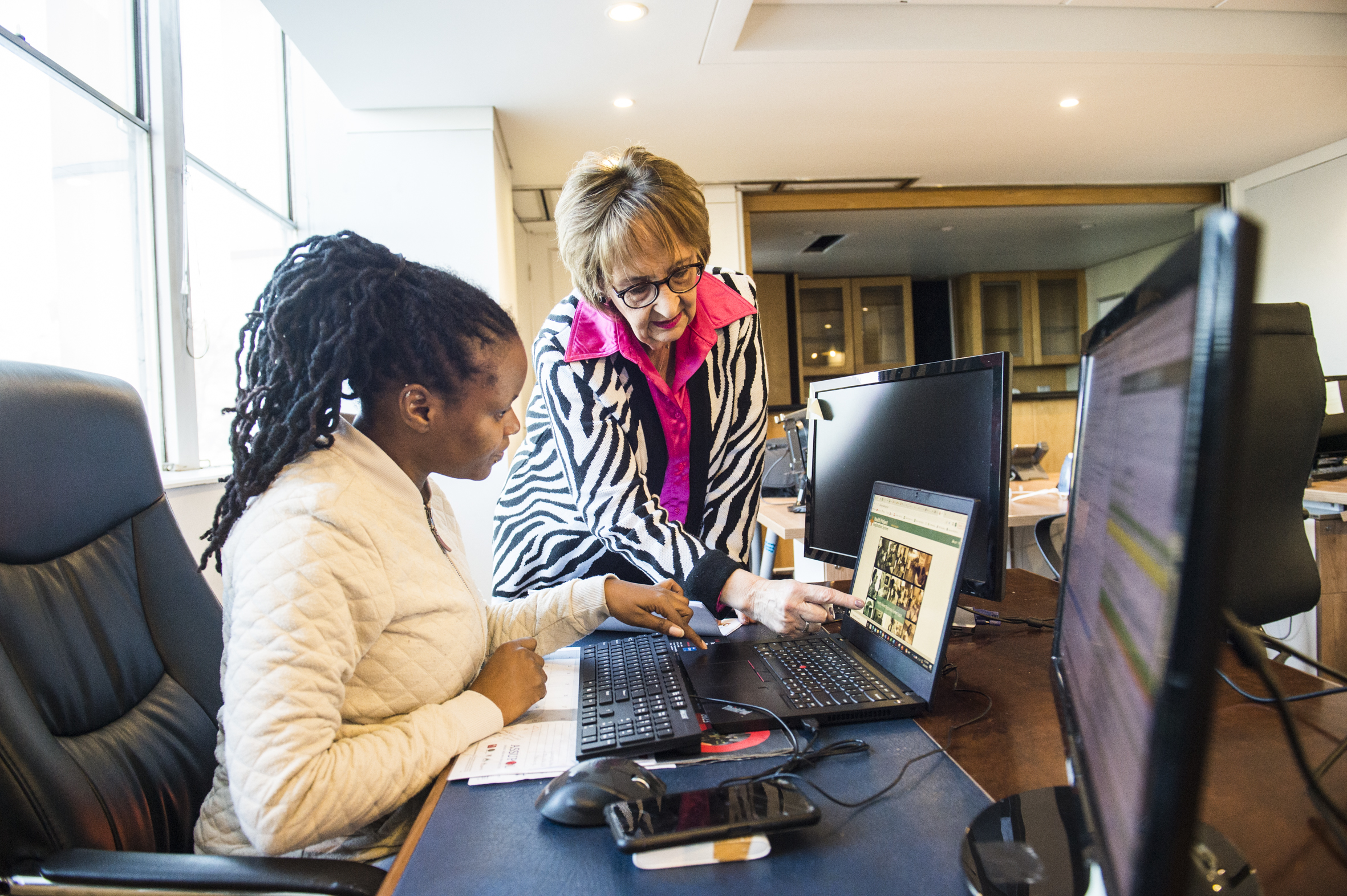
‘Admit when you don’t know the answer,’ is one of Wolmarans’s philosophies. Here she’s working with Motlatjo Selabe on digital health systems. (Photo: Delwyn Verasamy)
Effective people do not remain unnoticed for long, and alongside her official role Wolmarans was soon being asked to help with aspects of primary healthcare and what she refers to as “district development”.
“I have not been scared to raise my hand when someone asks, ‘who will do it?’. Nowadays it is different – I’m a bit more protective of my time – but back then I wanted to learn.”
In following this philosophy, Wolmarans ultimately showcased her versatility. She was appointed director of planning in Mpumalanga, and when the role of director of strategic planning opened up in the national Health Department she applied and was appointed.
Then director-general Precious Matsoso soon came to learn of Wolmarans’s zeal for taking decisions based on meaningful information, and asked her to spearhead a number of digital projects, including the development of the health patient registration system. Ultimately, she was seconded to work on digital health solutions.
“A lot that I know today is self-taught, and stems from jumping in the deep end and finding my way up,” says Wolmarans, explaining that she has always followed a few simple principles.
“Be open to people’s input, always. Engage very honestly and admit when you don’t know the answer.”
Wolmarans’s dream: The same system for everyone
I am again struck that someone so earnest, holding such old-school values, is currently in charge of what is arguably the most technically complex portfolio in healthcare governance.
In 2019, President Cyril Ramaphosa launched the country’s Presidential Health Compact, which presents a vision of health system reform divided into nine work areas, or pillars, with the goal of universal health coverage. Pillar nine (there are now 10 – an extra pillar was added after the second presidential health summit in May 2023) is: develop an information system, which is taken to refer to the development of the so-called health patient registration system – a master patient system that would synchronise existing provincial and private-sector patient registration systems. In fact, Wolmarans and her team are working on something far more ambitious.
“We want to create a medical biography for each individual, detailing all your medical events and important tests from your birth to where you are now, with access controlled by you as a citizen of the country.
“Such a system will improve quality of care, restore trust in our system and bring in massive efficiencies. It will also prevent diseases and mortality. “That’s my dream,” she says, “and it needs to be available for everybody, not only the privileged.”
A wedding, three ring carriers and the pain of loss
By prior agreement we haven’t talked about her private life, but Wolmarans is excited – it’s the eve of her daughter’s wedding.
“I’ve been married almost 40 years. We have three children, and it is the youngest who is getting married,” she says, flicking through her phone gallery until, with a whoop of delight, she comes to pictures of two of her grandchildren in their wedding outfits, one wearing suspenders and the other, tinier, in an outsized jacket.
“I freaked out when I saw them, they are just too beautiful. They will be the ring carriers, so when the priest says ‘do you take this person whatever whatever whatever’, the four-year-old will take the little one’s hand and they will both take the klein [little] boxy to them…”
Overcome with wheezing laughter, she is unable to finish the sentence, but her tone quickly steadies and she says: “I always say I have four grandchildren despite the fact that my one grandchild only lived 10 months. He taught me a lot of things. I have four grandchildren, all boys.”
Wolmarans assures me she is not the wedding planner (“I have just a few chores, like making serviettes – I’m good with my hands”), but rather “the pole keeping the tent up”. By all accounts the same description could apply in her professional life, too. DM
This story was produced by the Bhekisisa Centre for Health Journalism. Sign up for the newsletter.






















 Become an Insider
Become an Insider
Comments - Please login in order to comment.